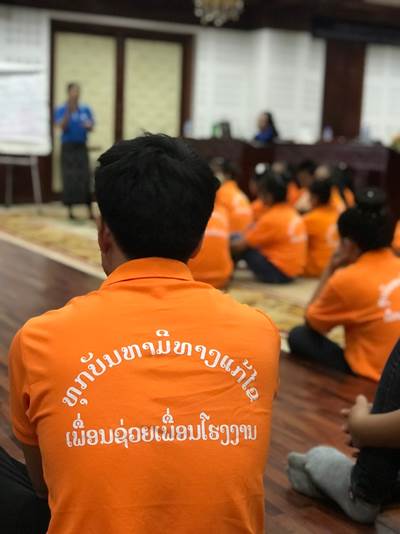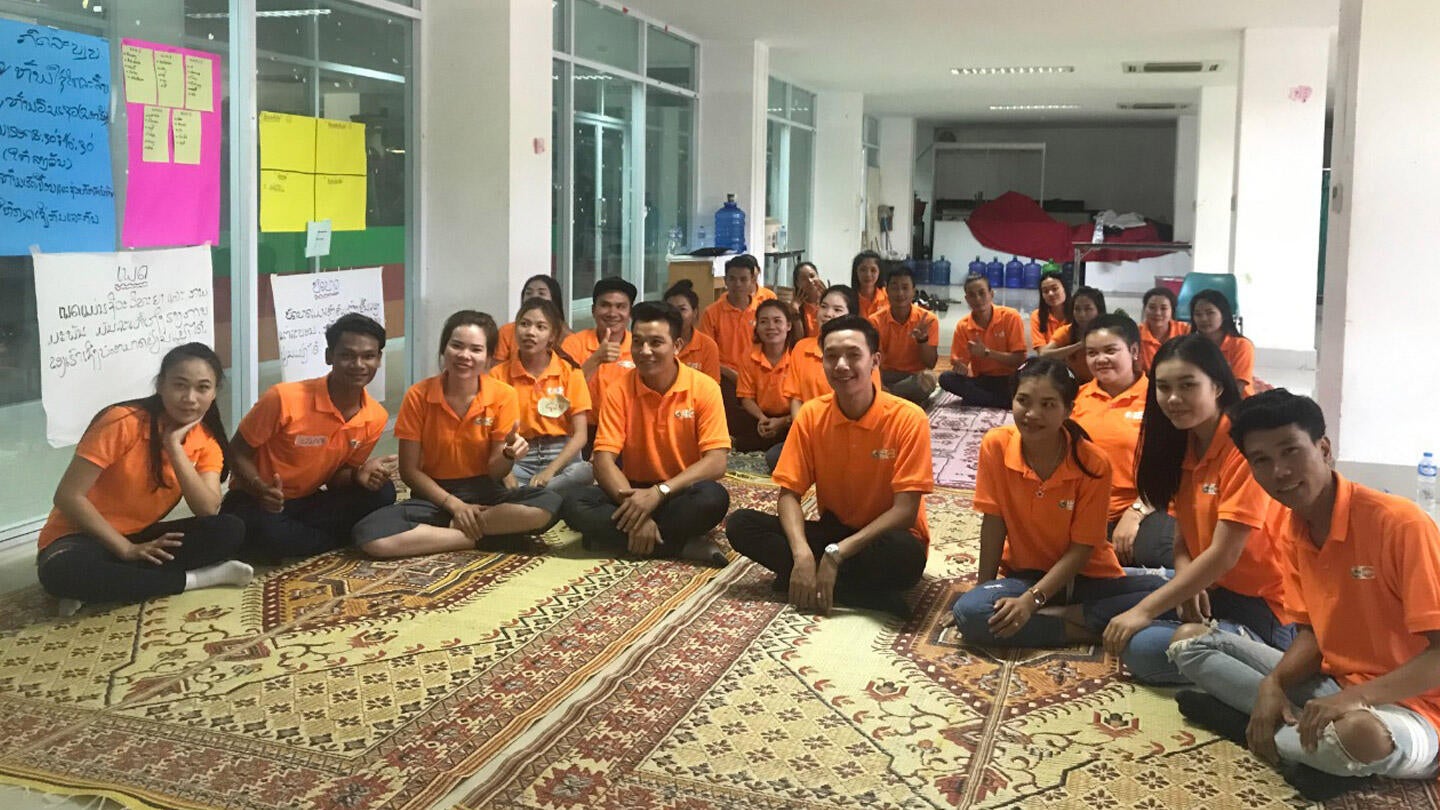Manivone was only 19 when she first came to work with the Venture garment factory from her hometown in Champasack Province in the south of Lao PDR. She left school five years ago and moved to the capital city of Vientiane to be a young factory worker like many of her friends. Manivone’s responsibility is to dispatch the equipment and items at the distribution point. In the evenings, she stays at the factory dormitory with other co-workers.
Recently her regular routine at the factory began to change when a sexual and reproductive health training progamme started among her co-workers. After working hours, young workers found themselves in lively learning sessions facilitated by the Vientiane Youth Center. Through games and quizzes, Manivone and the other young girls leaned a lot about sexual and reproductive health, including how to prevent unwanted pregnancy and sexually transmitted infections (STIs), how to deal with incidences of gender-based violence in relationships, how to manage excessive use of drugs, and alcohol, etc.
“I used to have unprotected sex with my boyfriend. At night I would leave my dorm to meet him in the cheapest guesthouse in the village. I really did not know that I could get pregnant. I did not know about condoms or any other methods. I took pills without counseling and without knowing how they work,” said Manivone. “If I did not have these sessions, I would still not know how to protect myself.”
Manivone has changed from someone who knew nothing about sexual and reproductive health to a peer educator on these topics. Her boyfriend, a worker of another factory nearby, told her that these sessions would be extremely helpful for the male workers to adopt a healthy lifestyle as well. “The young guys like to go out to drink and look for sex workers after they receive salaries. They did not know the risk,” Manivone agreed with her boyfriend. In her spare time, she likes to interact with her co-workers and shares information about the prevention of unplanned pregnancies, condom use, and substance control.
Lao PDR has a young population structure, with nearly 60 per cent of its 7.1 million people are under the age of 25 years. This represents a potential demographic dividend if greater investments are made to educate and empower them, including family planning and other essential sexual and reproductive health information and services.

The outreach activities Manivone and her co-workers have been attending at the Venture Factory were part of the UNFPA collaboration with the Lao Women’s Union, the Lao Federation of Trade Unions and the Vientiane Youth Center. Currently, four major garment factories operating in Vientiane, namely Diep Vu, Hatchi-Laos, Be Cooperate Export, Venture International (LAO), have signed up in an initiative to expand sexual and reproductive health information to around 2600 young employees. These young people, with the majority being female and unmarried, tend to face higher health risks due to multiple vulnerabilities as earlier school leavers, and migrants from poor and remote communities. Though the country has seen a significant expansion of family planning services, the usage of modern contraceptives remains extremely low at 14.5 per cent among unmarried women, while nearly half of married women are able to use modern contraceptives.
“When young people, women, and couples have autonomy over their well-being and sexual reproductive health, not only are they healthier, they contribute better for their families, employers, communities and the country’s economy,” Madam Khamphay Latsamy, President of the Lao Women’s Union emphasized the long-term impact from having a healthier workforce.
As the Representative of UNFPA in Lao PDR, Mariam Khan pointed out, “Engaging the private sector is essential for the sustainable development of the country. Such type of workplace-based interventions improve employee well being but also make for good business. Research shows increasing investment in family planning commodities, including contraception, is cost-effective, spending $1 on contraceptives can reduce subsequent reproductive health care costs by $7. Globally more and more companies are investing in workplace programmes to improve employee wellbeing which in turn improves employee retention, quality of work and profitability. ”
With support from the Lao Women’s Union, Ministry of Health and UNFPA, the Vientiane Youth Center has been using the youth-to-youth approach to provide sexual and reproductive health information and services at the Vientiane Youth Clinic, targeted outreaches and the hotline services (number 1360). With the 4 garment factories, the Vientiane Youth Center is also training peer educators from the factory employees so that they can help to expand the coverage to large numbers of their co-workers. Up to now, nearly 200 adolescents and young people from the four garment factories attended the outreach activities, and 50 of them have started engaging other co-workers as trained peer educators.
UNFPA and the partners plan to assess the impact of the tailored approach to deliver sexual and reproductive health information and services to young factory workers. Positive results may potentially lead to a longer-term intervention model that will generate better health outcomes for young people, as well as better efficiency and productivity for their employers.
This work directly contributes to realising the Lao Government 's commitments made during the Nairobi Summit on ICPD25 to invest in the 2030 Noi Framework for ending preventable maternal deaths, reducing child marriage and teenage pregnancy and ensuring that every woman and the couple can plan if when and how many children to have. Relevant Lao Government’s Commitments includes: End unmet need for family planning among adolescent girls by 2030 through the allocation of increased resources and expand quality youth-friendly services including SRH information and Family planning services women, men, and unmarried young people countrywide as well as in humanitarian response.
For more information, please visit https://www.lao.unfpa.org


